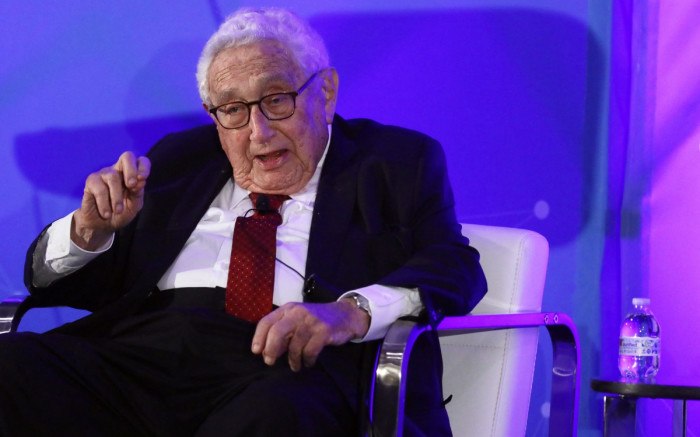
It said Kissinger’s family would hold a private funeral, with a memorial service to be held later in New York, where Kissinger grew up after his Jewish family fled Nazi Germany.
(FILES) Former U.S. Secretary of State Henry Kissinger speaks during a National Security Commission on Artificial Intelligence (NSCAI) conference on November 5, 2019 in Washington, DC. Image: AFP
WASHINGTON – Henry Kissinger, the former U.S. secretary of state whose uncompromising promotion of raw American power helped shape the world after World War II, died Wednesday, his consulting firm said. He was 100.
“Dr. Henry Kissinger, a distinguished American scholar and statesman, died today at his home in Connecticut,” Kissinger Associates announced in a statement late Wednesday.
It said Kissinger’s family would hold a private funeral, with a memorial service to be held later in New York, where Kissinger grew up after his Jewish family fled Nazi Germany.
A cause of death was not mentioned in the statement. Kissinger remained active as a centenarian, traveling to China in July to meet President Xi Jinping.
China was one of Kissinger’s most enduring legacies. Hoping to reignite the Cold War fight against the Soviet Union, Kissinger secretly reached out to Beijing, culminating in a historic visit by President Richard Nixon in 1972 and later the establishment of U.S. relations with the then-isolated country , which has risen to become the world’s second-largest economy and a growing competitor to Washington.
After the Watergate scandal brought down Nixon, Kissinger served under his successor Gerald Ford. In an unprecedented arrangement, Kissinger served as both secretary of state and national security adviser.
Kissinger received the Nobel Peace Prize for negotiations to end the Vietnam War, although the conflict did not end immediately and his North Vietnamese counterpart Le Duc Tho refused to accept the prize.
Despised in much of the world, Kissinger even enjoyed the respect of the rival Democratic Party as an elder statesman when incumbent Secretary of State Antony Blinken attended his 100th birthday party in New York.
“America has lost one of the most trusted and distinctive voices in foreign policy with the death of Henry Kissinger,” former President George W. Bush said in a statement.
REAL POLITICS AND ITS CONSEQUENCES
While Kissinger’s intellectual gifts have been grudgingly acknowledged even by his critics, he remains deeply controversial for his ruthless philosophy of realpolitik – the cold calculation that nations pursue their own interests through power.
Declassified documents showed that Kissinger gave his blessing to the undermining of Chile’s elected Marxist President Salvador Allende and later General Augusto Pinochet’s attempted coup in 1973.
Kissinger also supported Indonesia, a close anti-communist ally, when it captured East Timor in 1975. More than 100,000 East Timorese died from the start of the invasion – which began the day after Kissinger and Ford met with Indonesian leader Suharto – until the end of Indonesia’s occupation in 1999.
Kissinger also ignored Pakistan’s mass atrocities when Bangladesh gained independence in 1971 and believed that the US interest was to keep Islamabad as a silent mediator with China.
Nixon and Kissinger wanted to withdraw from Vietnam but had a stronger hand at the negotiating table and authorized a secret bombing campaign in Laos and Cambodia in 1969–1970 aimed at disrupting rebel movement into South Vietnam.
The bombing did not stop infiltration, killed thousands of civilians and contributed to the emergence of the genocidal Khmer Rouge.
Kissinger also showed little concern about Cyprus when the Greek military junta deposed its elected leader, Archbishop Makarios, and Turkey invaded the still-divided island in 1974.
ICONIC DIPLOMAT
But Kissinger never faced serious legal danger, as a U.S. judge in 2004 dismissed a lawsuit related to the assassination of the Chilean army chief.
Kissinger won praise across the U.S. political spectrum after the 1973 Yom Kippur War with his intense negotiations between Israel and Arab states that defined shuttle diplomacy.
He succeeded in separating the Arab powers from their Soviet patron and securing the role of the United States as the most important mediator and security guarantor in the region.
With his literally thick glasses and his deep, monotone voice that never lost a hint of his native German, the immigrant academic who became the ultimate insider became more recognizable to the public than almost any other state secretary in history.
He was also an unusual sex symbol and socialized with famous women. Once asked about his reputation, Kissinger responded with a classic realpolitik response: “Power is the ultimate aphrodisiac.”
He leaves behind his wife of almost 50 years, Nancy, two children from a previous marriage and five grandchildren, his consulting firm said.






Recent Comments